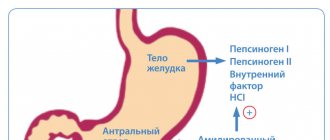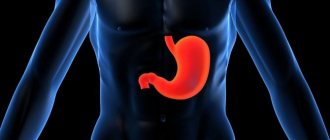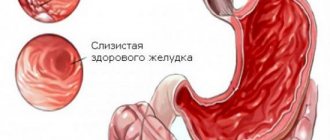These days there is a very unpleasant stereotype: gastritis is a disease of the 21st century, everyone has it, and nothing can be done about it. You just have to live with him. If you start listing the most dangerous misconceptions for human health, this will appear at the top of the hit parade.
Yes, indeed, gastritis is extremely common today (more than 80% of gastrointestinal diseases occur in various forms of gastritis). But is it necessary - and most importantly, is it possible to live with it? The answer is clear: no! If a doctor diagnoses you with gastritis, then it is necessary to urgently begin treatment and change the regimen and quality of food you eat.
But let's figure out what gastritis is, what danger it poses, and what steps should be taken if this scourge affects you.
Gastritis: save your stomach!
If the doctor tells you that you have gastritis, it means that the lining of your stomach is inflamed.
It all starts with acute gastritis, which occurs due to the fact that the mucous membrane is exposed to irritants such as alcohol, spicy food, spoiled foods, certain medications, other chemicals, and frequent smoking. Those people who do not follow a diet are also at risk of getting acute gastritis - they overeat, eat twice a day, but in large quantities, thereby overloading the stomach, etc. Some infectious diseases, as well as prolonged stress, can lead to gastritis.
Untreated acute gastritis eventually becomes chronic. The disease becomes sluggish and practically asymptomatic, and therefore much more dangerous. The mucous membrane of the stomach is affected more and more, the organ loses its ability to function normally.
And at this stage it is simply necessary to contact a gastroenterologist for qualified help. After all, chronic gastritis can eventually cause peptic ulcers and then stomach cancer.
You can avoid a sad outcome by strictly following all the doctor’s instructions. How will your life change with the advent of gastritis?
Chronic gastritis - long-term inflammation of the gastric mucosa
12.10.2021
Chronic gastritis is a long-term, prolonged inflammation of the gastric mucosa . This disease is very common and affects a significant part of the adult population.
How does chronic gastritis occur?
The factors causing gastritis are divided into two huge groups: internal factors and external factors.
Internal factors:
- genetic predisposition
- some diseases.
External factors:
- Bad habits. Smoking and drinking alcohol greatly contributes to the development of gastritis .
- Poor nutrition. This includes: eating dry food, eating spicy food, eating irregularly, drinking too hot and cold drinks.
- Some medications (aspirin, indomethacin)
- Harmful working conditions at work - dusty work with toxic substances
- Frequent stress
- Helicobacter infection - occurs when infected with Helicobacter pylari bacilli
How to identify chronic gastritis
Gastritis refers to diseases that are asymptomatic at an early stage. The most key symptom is the so-called pain “in the pit of the stomach.” Then there is a feeling of heaviness and fullness in the stomach and an unpleasant taste in the mouth . nausea may occur . Diagnosis of gastritis begins with a medical examination of the patient. After recognizing the signs, a full diagnosis begins. It is carried out as follows.
- Endoscopy - Study of the patient’s mucous membrane at this stage to determine whether the patient is infected with Helicobacter pylari or not
- blood test of the patient's stool and urine
- Ultrasound of the abdominal organs, especially the stomach
- Gastric acidity measurements
Correct treatment of chronic gastritis
Gastritis is treated not only by the use of medications. Gastritis can also be treated with a good diet . The following are completely excluded from the diet: carbonated drinks, alcohol, pickles, various seasonings and other foods harmful to the stomach .
The following types of medications are used to treat gastritis
- Antacid, enveloping and cleansing preparations. They have a quick, but not very long-term effect. You should definitely avoid using baking soda. Taking it stretches the stomach and then it will bring even more discomfort.
- Antibiotics if the infection is caused by a bacterial bacillus.
- To reduce the overall acidity of the stomach . This happens due to the blocking of special receptors
- In case of insufficiency of special digestive enzymes, preparations containing them are used.
Treatment of gastritis with natural remedies.
The following natural preparations are used: extracts of caraway, chamomile, milk thistle and some others. All these decoctions and extracts are contained in a preparation such as Iberagast. This natural drug perfectly suppresses the proliferation of Helicobacter, because it has a good antimicrobial effect. This drug also suppresses heartburn, a frequent companion of gastritis.
Now you know how gastritis , as well as what symptoms it has and what factors can cause its appearance.
Published in Gastroentorology Premium Clinic
New life with gastritis
So, you have gastritis. The gastroenterologist will prescribe you certain medications that reduce inflammation and restore the secretory function of the stomach. It is very important to remember that the prescribed medications will not have a traumatic effect on the inflamed mucous membrane, but you should refrain from taking other tablets and powders that are not part of the treatment course. If such a need arises, be sure to consult with your doctor.
However, no drugs will restore your health if you do not follow the doctor's recommendations. Let's list the most important of them.
We follow the diet
Gastritis can disrupt the perception of hunger. You may want to eat all the time or not feel the need to eat at all.
Following a nutritional schedule will help: 4-5 times a day in small portions. This way you will not feel hungry, and your stomach will not be overloaded with excess food.
Many patients agree that eating according to the clock is one of the most difficult elements of treating gastritis. However, a new eating behavior is gradually developed, and you get used to the fact that at a certain moment you need to feed yourself.
An important point: the last meal should be no later than four hours before bedtime.
Chew food thoroughly
Let’s get rid of the habit of eating “on the go” and swallowing pieces as quickly as possible! The more thoroughly we chew food, the less digestive juice affects it and the less it lingers in the stomach. This means that by working properly with our jaws, we will ensure that the gastric mucosa is not subject to such a strong load.
Eliminating a number of foods from the diet
Alas, to cure gastritis, you need to follow a certain diet. The doctor will recommend eliminating from the diet foods that are more likely to increase inflammation of the gastric mucosa than others.
So, what do we say goodbye to during treatment? Of course, with fried, smoked, stewed, spicy and fatty foods (including fatty meat, poultry and fish). We will also refuse canned food, dairy products with high acidity (kefir, sour cream, other fermented milk products), baked goods, pickled vegetables, legumes, and carbonated drinks. We will now brew tea and coffee less strongly. Let’s also say “no” to alcohol. Smokers should, if not completely give up the bad habit, then be sure to reduce the number of cigarettes they smoke.
And we don’t eat dry food!
Stick to a diet
What can you eat with gastritis, you ask? All those foods that do not harm the stomach.
Recommended are puree soups and broths (the main thing is that they are not spicy), dishes from lean fish, especially sea fish, meat dishes from beef, veal, chicken, turkey, rabbit. Vegetables and fruits should also become your faithful friends.
In fact, from all these products you can prepare a huge number of delicious dishes and delight yourself with delicacies.
And it is very important to drink a lot of water - at least 1–1.5 liters per day.
We try to relax
If we are treating gastritis, then we need to try to avoid stress and overwork, which can lead to aggravation of the disease.
Of course, doing this in our time is quite difficult, but each of us knows what calms and relaxes him most. Pleasant music, meditation, trips to theaters and museums, maybe conversations with a psychologist. Life should be comfortable, and gastritis will recede.
What is superficial gastritis
Superficial gastritis is the initial stage of any gastritis. With this disease, the inflammatory process and degenerative changes occur only in the upper layer of the mucous membrane. The main reason for such processes in the stomach is poor nutrition. Not to mention processed foods, alcohol, carbonated water and chips, an ordinary pickled cucumber or other spicy food eaten on an empty stomach can provoke the onset of the disease. The general weight loss hysteria that has gripped the population also often becomes the cause of gastritis, since alternating fasting and subsequent excess food consumption is extremely harmful to the stomach. Sometimes the cause of the disease is stress, not necessarily related to the nutrition process. The more provoking factors, the more likely the disease is to develop and occur with severe pain.
Gastritis: maybe it will go away on its own?
Unfortunately, gastritis is a disease that, once developed, will not give up its conquered positions. If you feel the first signs of the disease (heaviness and pain in the stomach, nausea, belching, heartburn, taste in the mouth, bloating, constipation), immediately make an appointment with a gastroenterologist.
SMC Best Clinic specialists will give you the correct diagnosis at the earliest stage and give detailed advice on how to eat properly and what other steps to take for treatment.
Don't risk your health! Gastritis is the first step on the path to stomach cancer. It's not your choice, is it?
University
Is stomach pain a sign of gastritis?
What causes the disease? Does it cause stomach ulcers? Valentina, Minsk. It is wrong to think that pain in the stomach is the main symptom of gastritis.
The essence of the disease is a pathological change in the structure of the mucous membrane. It can be confirmed by the result of a histological examination, and people, as a rule, do not feel these transformations. A feeling of heaviness, fullness in the epigastric region, heartburn, belching, pain and other unpleasant phenomena are associated with gastric dyspepsia (it accompanies gastritis). Only certain forms of gastritis (for example, erosive) manifest signs noticeable to humans.
What leads to gastritis
I would say that the main cause of this disease is chronic stress and incorrect psychological attitudes that determine the way of life. Poor nutrition is one of the provoking factors. If a person is in a state of constant tension, anxiety, anger, fear, then normal digestion of food is disrupted. It is no coincidence that there is a metaphor “I can’t digest it, I can’t stand it.” The stomach is an organ that is associated on a psychological level with the processes of acceptance/non-acceptance. Disorderly eating, abuse of spicy foods, eating dry and on the go overload the stomach. Coagulated protein, boiled and especially fried, is much more difficult to digest. Liquid food is useful: it does not require active grinding and does not contain excess protein, the most complex nutrient in structure, the digestion of which takes more than 50% of the energy received with it. Another factor in the occurrence of gastritis is infectious. The microbe Helicobacter pylori is the cause of the most common form of gastritis - type B (bacterial).
Gastritis does not live alone
Pathology is rarely isolated, since inflammation in one part of the digestive tract leads to functional and then organic changes in others - in the duodenum, pancreas, gall bladder and throughout the intestine. The gastrointestinal tract is responsible for the humoral component of immunity (antibody formation). With any disease, the risk of immune system disorder increases and allergic reactions appear.
Change your lifestyle
The epithelium of the mucous membrane and glands of the stomach are renewed quickly, which favors the normalization of the mucous membrane. But even with the right treatment regimen and diet, you cannot get rid of gastritis if you continue to lead an incorrect lifestyle. Often people do not want to change their psychological attitudes or give up bad habits (alcohol, smoking), so the illness remains with them forever... If you manage to change yourself, you can say goodbye to the diagnosis.
The exception is atrophic gastritis, in which the cells of the mucous membrane die. All that can be achieved in this case with the help of treatment is to prevent degeneration into a malignant tumor.
“Putting down” genes
A predisposition to gastritis exists, but it is realized only under appropriate external conditions. If a person works and rests in moderation, is satisfied with himself and life, eats a balanced diet, the genes “sleep”. Most often, what is prescribed by heredity turns out to be only family habits and eating patterns.
Where there is gastritis, there is an ulcer?
Gastritis types B and C can contribute to the development of peptic ulcers, but only in the presence of other negative factors - increased secretion of acid and pepsins, severe stressful situations, etc.
Gastritis type A (atrophic) prevents ulcer formation.
In my practice, there was a patient who suffered for a long time from atopic dermatitis of the face. During examination, this man was found to have multiple duodenal ulcers and calculous cholecystitis. They provoked a malfunction in the immune system, which manifested itself as a skin rash.
Approximately two thirds of Belarusians suffer from chronic gastritis.
Three important conditions for prevention
Eating should take place in comfortable conditions. Not on the street, not in transport, not “in between times.” Forget about the computer, TV and phone while eating. Approach lunch or dinner as a ritual, regardless of whether it is at home or at work. Washing your hands, not rushing, chewing well - everything should confirm that you are enjoying the process. Food is the first biological pleasure. Those who turn it into hasty snacks, eat with dirty hands, in an uncomfortable position and in the wrong place are haunted by gastritis and other gastrointestinal troubles.
Eat in a good mood. Learn to distract yourself from unpleasant thoughts, problems that you recently solved, don’t get stuck on them, or at least try to think in a positive, humorous manner. And if this fails and you are still tense, angry, upset, then first you need to restore your inner balance, and only then eat. By “eating” stress, you are guaranteed to get diseases of the digestive tract, regardless of what gets into your stomach.
Avoid overeating.
Do not eat burnt food, oil that has been used several times (it has a very negative effect on the gallbladder, which, in turn, affects the stomach). When a feeling of heaviness, fullness, or increased gas formation occurs, many swallow a life-saving remedy containing enzymes. But it’s better to have a fasting day or a short fast. While your stomach is resting, do not forget to relax emotionally: avoid conflicts and tension in relationships. Move more, be in nature. The digestive tract will recover on its own under such conditions. Anatoly Bliznyuk , Associate Professor of the Department of Polyclinic Therapy of BSMU Medical Bulletin , January 13, 2015
Treatment
How to treat superficial gastritis? First of all, you need to completely remove fatty and spicy foods from your diet, quit smoking, minimize alcohol, and eliminate dry food. It is advisable to forget about coffee and strong teas. If your nerves are severely shaken, you need to consult a neuropsychiatrist. This is necessary for recovery, since the stomach may refuse to work at all under constant stress and mental overload. It is necessary to eat in small portions and move more after meals to improve gastric motility. In this case, any treatment of gastritis should be supervised by a doctor. Even if therapy and drug intervention are not required at this stage, it is necessary to consult a specialist, otherwise self-medication will aggravate the condition and complicate the picture of the disease.
Diagnostics
When diagnosing, it is important to determine not only the form, but also the type of gastritis: atrophic, hypertrophic, gastritis with a low acidity level or with an increased one. This helps to understand the hypothetical scenario for the development of gastritis in the future. Thus, gastritis with low acid levels is considered the first signal for the possible development of cancer. Externally, the pathogenic process occurs only within the mucous membrane of the stomach itself. It is important to determine the cause of superficial gastritis and stop the disease at this stage. The cause of the disease can be: malnutrition, taking medications, working in hazardous work, stress (temporary and permanent), and an infection such as Helicobacter pylori. Superficial gastritis usually manifests itself very classically, and in some cases it proceeds without significant symptoms at all. More often it is discovered by chance, for example, during a routine examination. The only diagnostic method today that allows you to accurately determine the degree of gastritis, the level of changes in the stomach, the nature of the epithelium, the condition of the mucous membrane is gastroscopy, a kind of gastric bypass. The procedure is unpleasant, but very informative. Unfortunately, ultrasound and examination procedures for the stomach are ineffective and cannot help in diagnosis.
Causes of gastritis
Getting this disease is quite easy. The causes of gastritis are varied:
- Poor nutrition is when a person eats irregularly, dry food, snacking on fatty, fried foods and fast food. It is difficult for the stomach to digest such food, swallowed “on the run”, the mucous membrane becomes inflamed and gastritis occurs;
- Irritation of gastric tissues by medications, soda and chemical additives - taste enhancers, which are often found in semi-finished products. The same effect is caused by the abuse of alcoholic drinks, especially low quality ones, and energy drinks;
- Infection with the bacterium Helicobacter pylori, which causes severe forms of gastritis leading to ulcers. The microbe is introduced into the body through the mouth with food and dirty hands. Once in the stomach, bacteria colonize the walls of the organ, causing inflammation. A microorganism can exist in the body for a long time without manifesting itself, but as soon as the immune system weakens, colonies of bacteria begin to grow, causing inflammation of the stomach;
- Reflux gastritis occurs in diseases of the liver, gallbladder and duodenum. Due to pyloric insufficiency and increased pressure in the intestines, bile and caustic intestinal contents are thrown into the stomach, causing gastritis;
- Failure of the immune system when the body destroys its own cells, mistaking them for foreign ones. The antibodies produced attack the stomach, causing severe inflammation. This form of the disease is often hereditary.
The bacterium Helicobacter pylori
Gastritis is provoked by stress, especially chronic stress, metabolic diseases and parasites living in the body.








